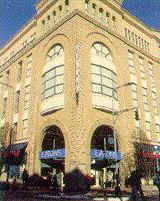INFORMATION
Tour Home
Contact Us
Copyright © 2000
History of Racialisation Group
Victoria, BC CANADA
All rights reserved
This page last updated
20 July 2000
Contact the Page Maintainer
Hosted by
the University of Victoria
![]()
This site
looks best with
![]()
Imperial Paradise?
An
Alternative Walking Tour of Victoria, BC
![]() The Eaton's
Centre
The Eaton's
Centre ![]()

The Eaton's Centre exterior.
Construction of the mall involved demolishing the original Victorian buildings on the site, a move which sat uneasily with local residents. In an attempt to calm public feeling, the designers and builders included recreations of the façade of the original buildings in the exterior walls of the four-storey centre.
The current façade are fantasies on the original Driard Hotel, the Victoria Theatre, the Times building, the Winch building and the Lettice and Sears building.
One of the mall's most interesting features is a clock that is suspended from the ceiling in front of what used to be the Eaton's store. Much like the building itself, the clock is a historical fantasy. On two sides of the clock are displayed local Victoria time and the slogan, "Victoria Eaton Centre Grand Opening 1990". On the other two sides are smaller, individual clock-faces supposedly displaying the time in Halifax, Bombay, Singapore and Brisbane on the north side, and London, Nassau, Zanzibar and Kowloon on the south side.
Beneath these smaller clock-faces there is a slogan which reads, "Westward the course of Empire goes forth". The source of this quote is unclear, but its message is an unmistakably imperial one.
The many times of Empire.
The clock floating above the commerce of the mall.
The slogan may allude to a line by philosopher George Berkeley, "Westward the course of Empire takes its way", which refers to the American push towards the west as part of its manifest destiny.
"Westward the course of Empire goes forth."
Why was this type of historical recreation chosen as interior decoration for a modern mall in a multicultural city? Whatever conclusion you draw it is interesting to note that the earliest promotional campaigns for consumer goods in the nineteenth century often drew on similar jumbles of disconnected historical ideas. Perhaps historical fantasy is a marketer's most valuable tool.